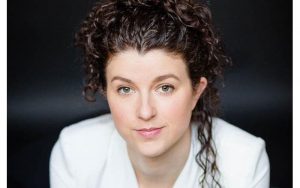Spotlight on… Dr Deborah Caswell
 Dr Deborah Caswell has recently been awarded a £25k grant through our Development Fund. Here, she discusses the impact on her research and career.
Dr Deborah Caswell has recently been awarded a £25k grant through our Development Fund. Here, she discusses the impact on her research and career.
Congratulations! What do you plan to do with your Development Fund, and what does it mean to have received this award as an early career researcher?
It’s incredible, really exciting, and means a lot – I’m blown away to have this funding. It could be the “make or break” contribution to the establishment of my lab at UCL.
I have preliminary data from my Post Doc showing a connection between APOBEC3 enzymes and formation of ecDNA. I will use my award to gather more data to solidify that connection, which in turn will enable me to apply for Fellowships and get my laboratory’s first manuscript out.
What’s so amazing about this award is that it allows me to pay for a staff scientist to collect data during my maternity leave, in collaboration with Professor Sam Janes at UCL. This will keep the ball rolling on my research, which is critical to starting the lab.
As a scientist, you really have to persist – especially at a career stage that for women can feel like an uphill battle. When you get these awards, you know you’re on the right track. Having the award gives me confidence and drive.
Tell us about your career to date.
I worked on DNA damage responses at the University of California San Francisco, and became interested in cancer. At Stanford, my PhD focused on lung cancer in smokers. After this, I became excited about Prof Charlie Swanton’s work at the Francis Crick using multi-region sequencing. This work showed intra-tumour heterogeneity, with the diversity of mutations within the tumour much higher than we previously realised.
I joined Charlie’s lab in 2016 as a Post Doc and became interested in the drivers of mutational diversity within lung cancer. I switched to studying never-smoker lung cancer, an emerging disease. What’s really fascinating is that this is more common in women, and people of Asian descent – we don’t know why, though it may be to do with air pollution, or genetic factors.
I wanted to understand what was driving this mutational diversity, and studied an enzyme called APOBEC. Normally during a viral infection, it’s up-regulated, inducing mutations in the virus that stop it functioning. It’s part of our protective immune response. But unfortunately in cancer, its expression is up-regulated within the cancer. This causes mutations in our own DNA, driving diversity in the cancer and allowing it to escape therapies.
What will you focus on in your own laboratory, which you will launch at UCL in April 2025?
I’ll continue to focus on APOBEC, more specifically understanding if this enzyme drives tumour initiation in patients. Are there environmental factors that cause inflammation – viral infection, air pollution, or inflammatory disease? Do these cause mutations or damage in normal tissue, driven by this enzyme? Can this cause lung cancer, either in smokers or never smokers?
Is there potential to explore a link between infection with SARS-CoV-2 and DNA damage?
This is something I’m very interested in exploring. It’s a new virus, people are getting repeat infections, long Covid, inflammation, chronic infection. This could be causing changes that contribute to lung cancer initiation.
I’m working with Professor Sam Janes – his two studies, SUMMIT and ASCENT, have been collecting samples from around 13,000 participants at high risk of lung cancer. The SUMMIT trial has samples prior to 2020, which will be incredibly interesting and useful to look at.
Where would you like your research to lead in future?
We just don’t know fully the effects of air pollution or viral infections, and it’s important for this research to keep going so that in the long term we could prevent these diseases. As children, we were told, “If you don’t smoke, you won’t get lung cancer”. That’s no longer the case, but there’s still stigma and misunderstanding – oftentimes, women will go the GP with pain and cough caused by lung cancer, but the diagnosis will be made late, because they are not a smoker. There’s a lot to do to raise awareness to help early diagnosis.
The best thing we could do is identify those at high risk and prevent these diseases, and that’s a whole emerging field in cancer biology. Vaccine development is a very complex new field, but I hope that over the next 20-30 years we could move to prevention. That would be wonderful, but there is a lot more exploration we need to do.
Tell us about your life outside work.
I moved to the UK eight years ago and love exploring the country, including going hill-walking in the Lake District. I love London and all the amazing, inspiring theatre and art. I’m thrilled to start my lab at UCL, which is such a great university.
